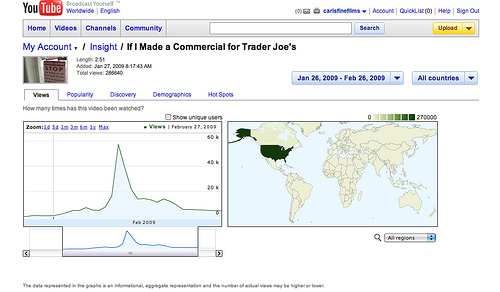A month ago, as I blogged, my friend Carl Willat posted on YouTube a video he’d made titled “ If I Made A Commercial For Trader Joe’s“. It has now received several hundred thousand views. I asked Carl for an update. He replied:
This video has received a better reaction than anything I’ve done in quite a long time. Â Of course part of this is just YouTube, where suddenly you can know what people think of your commercial, through the comments they leave and how many views you get. Â In the past commercials were just sent out into the ether and you never really heard any firsthand audience reaction. Â But some of my old commercials are on YouTube and none of them has this many hits. Â Even Christmas Kisses, which people really seem to like, has maybe 28,000 views in two years. And people aren’t posting it to their blogs or Facebook pages, as far as I know. Â So something is different about this one. Â To a large extent I’m trading on the goodwill people already have for Trader Joe’s. Â People just love that store. Â And the spot is subversive, which makes it more fun. Â But I think the main difference is the fact that it’s heartfelt, in that it reflects my actual feelings about Trader Joe’s, both positive and negative, and a lot of people can relate to those feelings. Â You can’t do that in a real ad because there’s an agency and a client that only want to say positive things about the product, and it has to be part of their overall strategy and so forth, which is fine, and I’ve certainly done my share of ads like that. But it’s hard to get genuine human feeling into traditional advertising, which is a shame, human feeling being the only thing people really care about.
The viewing history:

The spike happened after mention on Boing Boing.
I think Carl’s commercial is very important as a glimpse of the future. Long ago, only the powerful could speak to a mass audience — and they couldn’t tell the truth, for fear of losing their power. Then cheap books came along. Instantly a much larger group of people could speak to a mass audience — and, having little to lose, they could tell the truth. The truth, being rare, was an advantage. When science was young and many scientists were amateurs — Darwin, Mendel — they could tell the truth. As science became a job, a source of income and status that you could lose, scientists lost the ability to say what they really thought. For example, David Healy lost a job because he told the truth about anti-depressants. Self-experimentation is a way around this problem because, as I’ve said, no matter how crazy my conclusions I can keep doing it. I don’t need a grant so I don’t need to worry about offending grant givers.
Because TV commercials are a source of money and status (for ad agencies and marketing execs), they too have great difficulty being truthful. After watching Carl’s commercial I watched a Coke commercial that used the same music. The Coke commercial now struck me as horrible — flat and insincere. (Yet expensive.) Given the choice between an official statement — namely, the commercials you see on TV — and a personal one — a commercial like Carl’s — everyone will not only prefer to watch the personal statement but will also be more persuaded by it. Win-win. So it is in the self-interest of any company that makes a product that somebody loves to stop making the usual insincere stuff and start finding people who love their products and help them express it.
I discovered why TJ’s always drops the products you like best. If something spends much of its time out of stock, sometimes just because it’s popular, then to TJ management that counts as poor sales, and they drop it. Sometimes, as with the pomegranate/cherry juice they dropped last year, they sell product X coupled with less popular products Y and Z (e.g. pomegranate/cranberry and pomegranate/blueberry juice). X sells out in a week, and a month later they order more X/Y/Z, but X never sells more than Y. I think TJ doesn’t remedy this sort of thing because they have a policy of turning over their selection by 20% per year, and anything that generates sales disparities makes it easier to choose victims.
“Airborne” cold prevention pills, featured in the ad, remain a fraud. TJ’s toilet paper rolls, by the way, recently got 7% narrower without changing price.